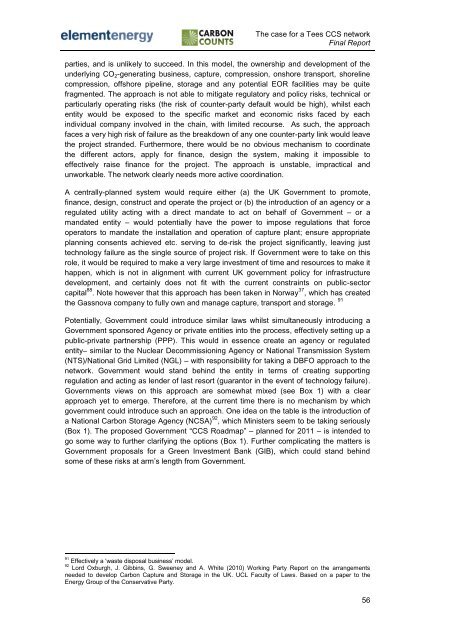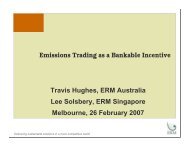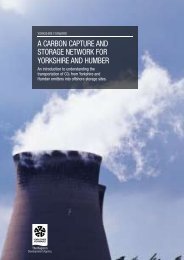<strong>The</strong> case <strong>for</strong> a Tees CCS network<strong>Final</strong> Reportparties, and is unlikely to succeed. In this model, the ownership and development of theunderlying CO 2 -generating business, capture, compression, onshore transport, shorelinecompression, offshore pipeline, storage and any potential EOR facilities may be quitefragmented. <strong>The</strong> approach is not able to mitigate regulatory and policy risks, technical orparticularly operating risks (the risk of counter-party default would be high), whilst eachentity would be exposed to the specific market and economic risks faced by eachindividual company involved in the chain, with limited recourse. As such, the approachfaces a very high risk of failure as the breakdown of any one counter-party link would leavethe project stranded. Furthermore, there would be no obvious mechanism to coordinatethe different actors, apply <strong>for</strong> finance, design the system, making it impossible toeffectively raise finance <strong>for</strong> the project. <strong>The</strong> approach is unstable, impractical andunworkable. <strong>The</strong> network clearly needs more active coordination.A centrally-planned system would require either (a) the UK Government to promote,finance, design, construct and operate the project or (b) the introduction of an agency or aregulated utility acting with a direct mandate to act on behalf of Government – or amandated entity – would potentially have the power to impose regulations that <strong>for</strong>ceoperators to mandate the installation and operation of capture plant; ensure appropriateplanning consents achieved etc. serving to de-risk the project significantly, leaving justtechnology failure as the single source of project risk. If Government were to take on thisrole, it would be required to make a very large investment of time and resources to make ithappen, which is not in alignment with current UK government policy <strong>for</strong> infrastructuredevelopment, and certainly does not fit with the current constraints on public-sectorcapital 88 . Note however that this approach has been taken in Norway 37 , which has createdthe Gassnova company to fully own and manage capture, transport and storage. 91Potentially, Government could introduce similar laws whilst simultaneously introducing aGovernment sponsored Agency or private entities into the process, effectively setting up apublic-private partnership (PPP). This would in essence create an agency or regulatedentity– similar to the Nuclear Decommissioning Agency or National Transmission System(NTS)/National Grid Limited (NGL) – with responsibility <strong>for</strong> taking a DBFO approach to thenetwork. Government would stand behind the entity in terms of creating supportingregulation and acting as lender of last resort (guarantor in the event of technology failure).Governments views on this approach are somewhat mixed (see Box 1) with a clearapproach yet to emerge. <strong>The</strong>re<strong>for</strong>e, at the current time there is no mechanism by whichgovernment could introduce such an approach. <strong>One</strong> idea on the table is the introduction ofa National <strong>Carbon</strong> Storage Agency (NCSA) 92 , which Ministers seem to be taking seriously(Box 1). <strong>The</strong> proposed Government “CCS Roadmap” – planned <strong>for</strong> 2011 – is intended togo some way to further clarifying the options (Box 1). Further complicating the matters isGovernment proposals <strong>for</strong> a Green Investment Bank (GIB), which could stand behindsome of these risks at arm‟s length from Government.91 Effectively a „waste disposal business‟ model.92 Lord Oxburgh, J. Gibbins, G. Sweeney and A. White (20<strong>10</strong>) Working Party Report on the arrangementsneeded to develop <strong>Carbon</strong> Capture and Storage in the UK. UCL Faculty of Laws. Based on a paper to theEnergy Group of the Conservative Party.56
<strong>The</strong> case <strong>for</strong> a Tees CCS network<strong>Final</strong> ReportPresent policy messages from Government leave flexibility on the approach to delivering pipelineinfrastructure <strong>for</strong> CO 2.In recent speeches made to the 1 st CCS Senior Stakeholder Conference in July 20<strong>10</strong>, both Chris Huhneand Charles Hendry – Secretary of State and Minister <strong>for</strong> Energy respectively – talked of the need <strong>for</strong>Government to “work in partnership with business” to get CCS going. Charles Hendry stated that“innovative financial services” will be required to devise solutions to mobilising the “vast amount of capitalneeded”. He also added that the UK demonstration programme already includes support <strong>for</strong> the nascentinfrastructure that will be necessary to support the deployment of CCS throughout the economy, notingthat if the UK is to make a real success of carbon capture and storage, it has to develop the infrastructureof pipelines and encourage clusters of those facilities in certain areas. He further acknowledged that anumber of regional bodies are considering how the development of regional CCS infrastructure will helpthem sustain and attract high carbon emitting industries in a carbon constrained world, and how they canstimulate the development of that infrastructure through regional partnerships His footnote to this was thatGovernment has to take a long-term strategic view, and there<strong>for</strong>e will also look at the sort of infrastructurethat will be needed to deploy CCS beyond the demonstration stage and how the UK can use thedemonstration programme to set the seeds <strong>for</strong> that future. He also added that further consideration ofwhat more Government could do to help this process, including a role <strong>for</strong> an Agency as recommended byLord Oxburgh [to the Conservative Party Energy Committee] (op cit).This is a more progressive view <strong>for</strong> future proofing the UK CCS demonstration projects and relatedpipeline infrastructure than expressed four months previously (under the previous administration). In the<strong>report</strong> “Clean coal: and industrial strategy <strong>for</strong> the development of carbon capture and storage across theUK” (March, 20<strong>10</strong>), the Government of the time concluded that the establishment of a central agency“would be premature at this time”, and that the demonstration projects “would require no more than fourpipelines...[and]...consequently, the opportunities <strong>for</strong> network integration and „masterplanning‟ are unlikelyto be significant during the demonstration phase”.Very recently, the Government has issued a Call <strong>for</strong> Evidence on Developing <strong>Carbon</strong> Capture and StorageInfrastructure. In this the Government has explicitly (i) recognised the economies of scale inherent inpipeline transport; (ii) confirmed that projects securing demonstrating funding will be able to invest inadditional pipeline or storage site capacity at marginal cost; (iii) identified that the risk of stranded assetsare not materially different if the investment is privately or publicly financed; (iv) solicitied opinions on thebenefits of centralised and decentralised models of developing CCS infrastructure.In a decentralised model <strong>for</strong> developing transport infrastructure, decisions on design (e.g. routing andcapacity) are left to the market, although optimised through creating <strong>for</strong>mal open season arrangements soother parties can make their interest known in joint developments, providing an obligation to provide tapsand interconnections to facilitate growth of the network, unbundling transport ownership, developing asecondary market in pipeline capacity to ensure efficient utilisation, and a regulated tariff structure tocontrol the basis of charging <strong>for</strong> pipeline access.In the central approach, benefits identified include strategic planning, impetus to develop private-publicfunding partnerships, and managing contracts between emitters and stores. Challenges includeacquisition of infrastructure funded under the demonstration programme, reducing the opportunities <strong>for</strong>commercial development of transport and storage businesses, loss of incentive to maximise efficiency,inconsistency with the approach to funding investment elsewhere in the economy, and increased pressureon the public finances. A central authority could be charged with oversight of aspects of transportBox 1 Recent UK Government views on CCS infrastructure financing 88Neither the laissez-faire or centrally-planed approach appears practical or feasible in thenear-term. <strong>The</strong> organically developed system is not stable enough to emerge, whilst thepossibility of a centrally planned system emerging seems some way off from57







